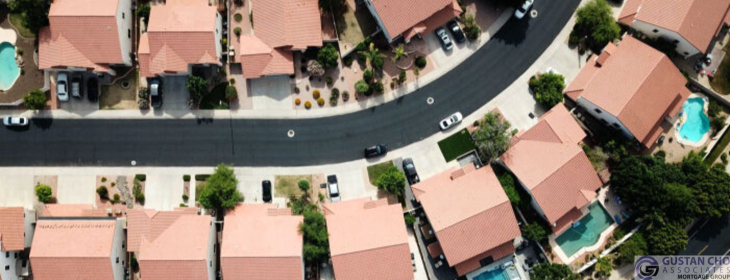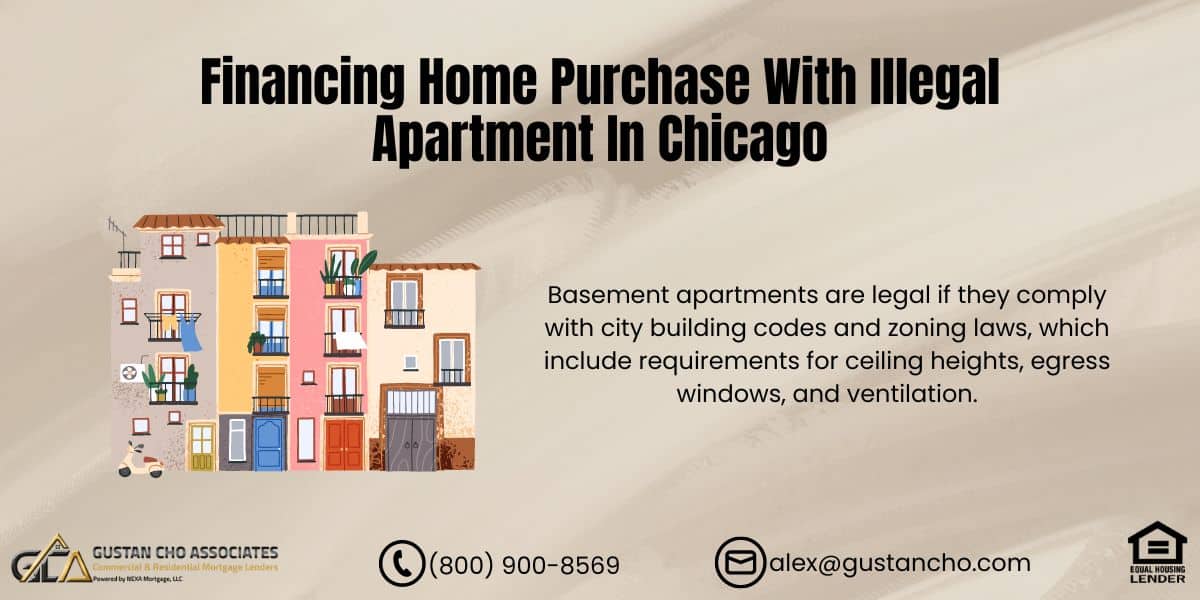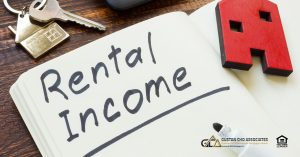When considering Home Purchase With Illegal Apartment in Chicago, prospective buyers have access to various financing options through government and conventional lending programs. FHA loans require a minimal down payment of just 3.5% for owner-occupied two to four-unit properties. The VA provides an attractive 100% financing option for these multi-unit homes, targeting veterans. On the other hand, Fannie Mae and Freddie Mac stipulate a 15% down payment for similar properties.
In Chicago, many multi-unit properties include illegal basement or attic apartments. This city boasts the highest number of two to four-unit residential buildings in the nation, with many featuring unauthorized additional living spaces. Such units often complicate the financing and legality of a property transaction.
This article delves into the specifics of a home purchase with an illegal apartment in Chicago. It highlights the challenges and critical points to consider when navigating the financing landscape for properties, including unauthorized apartments, offering insights into the potential impacts on the purchasing process.
Chicago Real Estate Market
In Chicago and its suburbs, it’s quite common for owners of two to four-unit properties to convert their basements into unauthorized apartments, complete with bedrooms, bathrooms, and kitchens. These illegal basement apartments are often not just used as in-law suites; most homeowners choose to rent them out to tenants for additional income.
The Chicago Building Department is aware of these conversions, and often, building inspectors overlook such modifications. While some basement apartments have been grandfathered and are legal, many remain illegal.
This situation is crucial for anyone involved in a home purchase with an illegal apartment. Despite the prevalence of these units and the ongoing rental practices, potential buyers should be aware of the legal implications and possible future enforcement actions that could affect the property’s use and value. Understanding the risks of buying a home with an illegal apartment is essential for making an informed decision and navigating potential legal challenges. Speak With Expert to Get a Home in Chicago
Are Basement Apartments Legal in Chicago?
Yes, basement apartments are legal in Chicago. Still, they must meet specific requirements set by the city’s building codes and zoning laws. These requirements include adequate ceiling heights, proper egress windows, and sufficient ventilation, among other safety and habitability standards.
Landlords must ensure that these units are up to code to be legally rented. Additionally, some areas may have specific zoning regulations that must be followed. Suppose you’re considering renting or leasing a basement apartment. In that case, verifying that the unit complies with all local regulations is a good idea.
Can I Get A Mortgage On Home Purchase With An Illegal Apartment In Chicago?
Yes, basement apartments are legal in Chicago. Still, they must meet specific requirements set by the city’s building codes and zoning laws. These requirements include adequate ceiling heights, proper egress windows, and sufficient ventilation, among other safety and habitability standards.
Landlords must ensure that these units are up to code to be legally rented. Additionally, some areas may have specific zoning regulations that must be followed. Suppose you’re considering renting or leasing a basement apartment. In that case, verifying that the unit complies with all local regulations is a good idea.
All mortgage lenders will require a home appraisal on the subject property.
When engaging in a home purchase with illegal apartment, the appraisal process becomes crucial. The appraiser will specifically document the legality of the basement apartment and indicate if it is illegal.
Lenders, in such cases, are particularly diligent. They require proper building permits and will cross-check the reported square footage with county records to address any discrepancies highlighted in the appraisal report. This thorough review ensures that all aspects of the property comply with legal and safety standards. Get a Mortgage on Home Purchase in Chicago
Square Footage Of Property Versus County Records
When purchasing a home that includes a room addition, it’s crucial that the square footage listed on the appraisal report aligns with the figures recorded on county or city records, whether the addition is on the ground floor or a second story.
Basements are treated distinctly in these scenarios. They are not considered part of the home’s official living square footage and are typically exempt from square footage verification. Importantly, most mortgage lenders recognize the presence of illegal basement apartments and tend to disregard them during the evaluation process.
However, during a home purchase with illegal apartment, if a mortgage lender raises concerns, the buyer might be required to disconnect utilities such as gas and electricity from the kitchen in the illegal apartment to meet the lender’s requirements.
Rental Income Cannot Be Used On Home Purchase With Illegal Apartment

On home purchase with illegal apartment, the rental or potential income cannot be used.
- Home purchase with Illegal apartment will only be considered as a furnished basement and not an income-producing basement apartment. Homebuyers of 2 to 4 unit properties with an illegal basement apartment should not be concerned when it comes to financing it.
- Most mortgage lenders who originate and fund loans in Chicago and surrounding suburbs in Chicago do understand and know about illegal basement apartments.
If the mortgage lender is giving a hard time on the illegal basement apartment, please contact us at Gustan Cho Associates Mortgage Group at 800-900-8569 or text us for a faster response. Or email us at alex@gustancho.com. The team at Gustan Cho Associates is available 7 days a week, evenings, weekends, and holidays. Speak With Our Loan Officer for Pre-approval for Mortgage Loans
FAQ: Financing Home Purchase With Illegal Apartment In Chicago
- 1. Are basement apartments legal in Chicago? Yes, basement apartments are legal if they comply with city building codes and zoning laws, which include requirements for ceiling heights, egress windows, and ventilation.
- 2. Can I get a mortgage on a home with an illegal apartment in Chicago? Yes, it is. But obtaining a mortgage on a home with an illegal apartment can be complex. All mortgage lenders require a home appraisal, where the appraiser will note the legality of any basement apartment. If the apartment is illegal, lenders may require that building permits are in order and cross-check the reported square footage with county records. In some cases, the buyer might need to disconnect utilities like gas and electricity from the kitchen in the illegal apartment to meet lender requirements.
- 3. How does an illegal apartment affect financing and property value? While illegal apartments often provide additional rental income, this potential income cannot be considered in the mortgage application process for a home with an illegal apartment. These units are typically regarded as furnished basements rather than income-producing properties. Most lenders in Chicago and its suburbs are familiar with illegal basement apartments and often understand the situation, which can ease the financing process. However, potential legal implications and enforcement actions could affect the property’s use and value in the future.
- 4. What happens if a lender scrutinizes an illegal apartment during the purchasing process? If concerns arise, lenders may require you to ensure all building permits are in order and may check property details against county records. Non-compliance could necessitate utility disconnections or other modifications.5. What should I consider before buying a property with an illegal apartment? Understand the potential legal and financial risks, including future enforcement actions that could impact the property’s usability and value. To ensure compliance, following all the local building codes and zoning laws is crucial.
For more detailed assistance regarding a home purchase with an illegal apartment, contact Gustan Cho Associates Mortgage Group at 800-900-8569 or alex@gustancho.com.
This blog about Financing Home Purchase With Illegal Apartment In Chicago was updated on April 23rd, 2024.








Is it ok for a landlord to uninstall a kitchen in an illegal unit for an appraisal, and reinstall the kitchen once the appraisal is complete? There is a tenant living in the illegal unit and needs use of the kitchen for the duration of her lease.
Yes, perfectly fine to uninstall the kitchen and once the appraisal is done, reinstall it. This is how it is normally done.